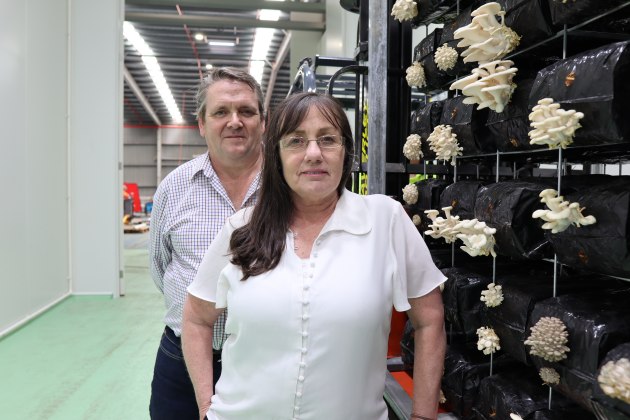The establishment of Epicurean Food Group’s (EFG) multi-million-dollar, vertically integrated mushroom production facility has Adelaide poised to become the exotic mushroom capital of Australia.
The first of its kind in Australia, the facility aims to provide more than 20,000 tons of exotic mushrooms to the consumer retail sector per annum.
EFG is a producer of a large range of exotic fungi as well as low allergen and gluten free food. Most of its products are based on oyster mushrooms and include vegan friendly mushroom burgers and sausages, which it provides to supermarkets around the country.
The company says it wants to significantly reduce Australia’s reliance on imported exotic mushrooms, which are becoming increasingly popular due to taste, versatility and health benefits.
The facility is currently set on 4000sqm, and comprises of six growing rooms spanning 20 metres long and 6 metres high.
Before the end of 2024, the facility is set to expand to occupy to 35,000sqm, where thousands of Oyster, Shiitake, Enoki, King Oyster and Lion’s Mane mushrooms will grow in columns up to 13 metres high in specially designed growing rooms.
EFG’s chief scientific officer, Dr Leanne McGrath, said that exotic mushrooms have become increasingly popular as an alternative wholefood source for people of all diet philosophies.
“Australians haven’t had the best access to exotic mushrooms or top-quality mushroom products and this is what we intend to remedy.
“Other than supplying the existing market, our plan is to entice Australians to add more exotic mushrooms in wholefood form to their diets and also to make genuinely healthy mushroom products, like burgers, available to time-poor families who want easy-to-prepare, great tasting and healthy meal solutions,” said McGrath.
EFG chief executive Kenneth King says approximately 85 per cent of Australia’s exotic mushroom supply comes from imports, and has shaped the market accordingly.
“We are establishing Australia’s only vertically integrated mushroom manufactory in Australia that manages the whole cycle from the curation of mushroom cultures in a lab, to the growing and distribution of fresh produce using regenerative farming practices, to the processing and production of mushroom products in a high-tech commercial kitchen – all on one site,” said King.
The facility is currently in phase one of its development. By the end of 2024, it aims to be a world leader in mushroom production and related product manufacturing, and even has plans for a production arm for mycelium, or ‘Mylo’, a new sustainable leather made from mushrooms.
King envisages that around 20 per cent of employees will be from the disadvantaged or long-term unemployed community, and says production being carried out during normal working hours is something unusual for the industry; and wants to place an emphasis on creating a work/life balance for employees.
“We currently employ 31 staff and have 60 engaged on a contract basis but the goal is to have created up to 350 full-time jobs for people of all abilities, by the end of next year,” said King.
Minister for Trade and Investment Nick Champion said, “Epicurean Food Group is a fantastic story of a local business that is expanding allowing them to reach new customers and stocking our supermarkets and speciality stores with exceptional products.”

Domestic convenience foods are valued at $3.7 billion, with exports valued at $1.6 billion during the same period, equating to a 3 per cent per annum growth.
In 2019, the market value of plant-based foods worldwide was estimated to be worth US$11.1 billion. This figure is forecast to steadily increase and reach around US$34 billion in 2027.
EFG intends to produce 10,000 mushroom burgers per week by May this year, followed by mushroom balls, sausages and crumble later in the year.
“Many of the plant-based burger products on the market are just not as healthy, allergen-free or tasty as consumers prefer.
“Using our freshly grown oyster mushrooms, we make naturally healthy burgers that are tasty and have a texture you can really get your teeth into and that are also higher in fibre and nutrition,” said McGrath.






